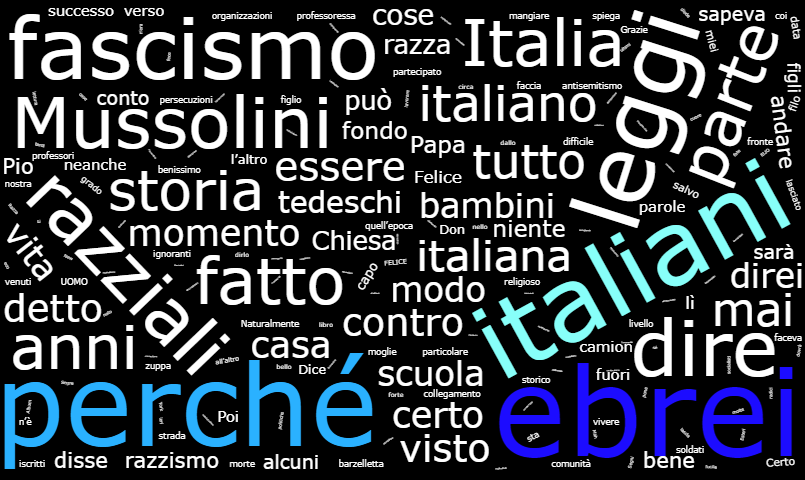"Have there ever been racial laws in Italy?"
Vox Populi 2020
In October 2020 we returned to ask passers-by the same question posed by the 'Sorgente di Vita' television crew in 1988 (see the 2 clips above).
Same question, same area of Rome (the 'nice' suburb of Prati), same places: namely, the Metro exit at Via Lepanto and a local market.
Even after 32 years, the situation does not appear to have improved much. Of course, many know, and are even sometimes surprised or almost offended to be asked such an obvious question. But, just as many, in fact, the exact half, still do not know what the Racial Laws were.
To these must be added those who know something, but in a very confused way. Their memories on the subject are cloudy and haphazard, and give rise to contradictory answers. In short, the most recurring response is one of confusion, even more so than ignorance.
Here is an anthology of the answers we received.
Many respondents, realizing that they had not been able to answer, concluded, by way of justification, that at the time they had not yet been born. This answer was given candidly, in perfect good faith, which, however, highlights an educational failure, since it reveals how these respondents consider history as not even being part of their potential resources to acquire knowledge on anything that they have not experienced personally, for reasons of age. It is as if they were explaining the fact that they do not know that the United States or Brazil exist because they were not been born there, like it wasn't exactly in this that lie the utility of having at least some basic notions of geography. Similarly for history, all the more when it regards their own country's recent past, ike in this case. In short, this is another sign of 'presentism', of loss of memory, something that we think should be of concern for both academic and public historians.
Credits
We would like to thank:
Rai Direzione Teche for having kindly granted the video extracts of the Rai broadcasts presented here.
The CDEC Centro di Documentazione Ebraica Contemporanea (Center of Contemporary Jewish Documentation) and Forma International for allowing us to use the extracts from the documentary film “Memoria” by Ruggero Gabbai.
Daniele Fusi, Federico Dassiè and Carlo Costa for the technical support on web development.
The videomaker Fabio Colazzo and the company Jusweb for cooperating to our street interviews (‘vox populi’ 2020)
We request those who draw on the information provided here, whether in academic or non-academic contexts, to always cite our work with link and source, as follows: Leonardo Campus, I conti con la Storia. Le leggi razziali tra televisione e storiografia (Confronting History. Italian Racial Laws: Memory, Television, Historiography), WebDoc, VeDPH Ca’ Foscari University of Venice, 2020, www.iconticonlastoria.it / www.confrontinghistory.it
The WebDoc was presented online by the VeDPH on January 12, 2021 with the historians Stefano Dall’Aglio, Simon Levis Sullam (both professors at Ca’ Foscari University of Venice) and Gadi Luzzatto Voghera (director of the Foundation CDEC – Centro Documentazione Ebraica Contemporanea). The recording of the event is visible HERE.
Click HERE to read the article published by “Il Corriere della Sera”, Italy’s main newspaper, on the webdoc (“unmissable”, according to their columnist G.A. Stella).
English-speaking scholars may find further info on this research in the VeDPH online seminar delivered by the author in English on May 13, 2020, visibile HERE.
Leave us your comment
(it will be published after approval by moderator)
Vincenzo Alfio Motta
2021
Complimenti. Avete creato un ottimo strumento per riflettere non solo sugli eventi, ma soprattutto sull’interpretazione che ne è stata data. Il formato scelto, secondo me, è adeguato a una maggiore divulgazione e, al contempo, offre tante piste di approfondimento per i più curiosi e interessati all’argomento.
Grazie per quest’iniziativa!
Alessia Guida
2021
Un lavoro ben fatto, illuminante e ricco di spunti di riflessione. Stupisce come nonostante Internet sia uno strumento potente e fruibile da tutti, il monopolio dell’informazione rimane appannaggio della tv e la costruzione dei palinsesti sia studiata per uniformare l’opinione comune. E non è un caso che al giorno d’oggi in una società multiculturale come la nostra i personaggi della tv siano perlopiù italiani e si parli pochissimo di razzismo. Grazie per queste informazioni.

